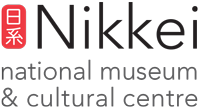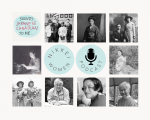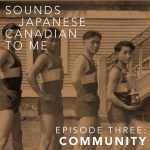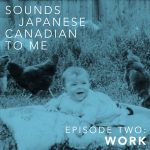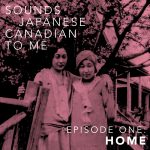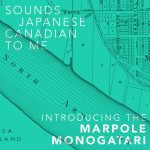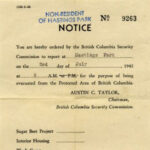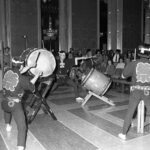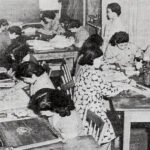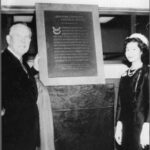Season 4: Nikkei Women
During the run of the “Iron Willed: Women in STEM” exhibition, we will be sharing stories of Nikkei Women. Lives of remarkable Japanese Canadian women who have survived through the Japanese Canadian internment will be presented by Julie Tamiko Manning. Subscribe now on your favorite podcast platform so you don’t miss an episode and tune in weekly.
July-September 2021
Season 3: Marpole Monogatari
The Sounds Japanese Canadian To Me podcast features a new series Marpole Monogatari on life at home, work, and in the community for Japanese Canadians in pre-War Marpole. Hear David Suzuki’s father talk about the birth of his twins, as well as Joy Kogawa singing a favourite song from kindergarten. Hear Mush Arima talk about buying a chicken from David Suzuki’s grandmother, along with other stories of triumph and tragedy from former residents, descendants, and associates.
June-July 2021
Stories From the Stage: 2020-21
In the age of social distancing, performing artist Kunji Mark Ikeda takes the reins of Sounds Japanese Canadian to Me to lead a series of in-depth conversations with some of today's most exciting Japanese Canadian performing artists.
Listen on our website, or subscribe on Apple Podcasts, Google Podcasts, Spotify, or Stitcher.
We acknowledge the support of the Canada Council for the Arts, Calgary Arts Development, and the Rozsa Foundation.



Season 1: 2013-2017
Sounds Japanese Canadian to Me is a monthly podcast hosted by Raymond Nakamura and staff members at the Nikkei National Museum. They sit around a microphone (usually in the museum's collection vault - for ambience) and have a casual discussion on a chosen Japanese Canadian topic. The goal of this endeavour is to entertain and wow people about Japanese Canadian history and culture.

Explore the fascinating world of Japanese Canadian history and culture with Sounds Japanese Canadian to Me. Our first series is hosted by Raymond Nakamura and Nikkei National Museum staff members features casual discussions on Japanese Canadian topics. Our second series, Stories from the Stage, features interviews between Kunji Mark Ikeda and some of the most exciting Japanese Canadian performing artists living through the age of social distancing.
Episodes
Introducing the Nikkei Women series
Tune in weekly for stories of amazing Nikkei women on Sounds Japanese Canadian To Me.
> read more→Marpole Monogatari – Community
Community stories of Japanese Canadians who lived in the Marpole neighbourhood of Vancouver tended to intermingle more with non-Japanese.
> read more→Marpole Monogatari – Work
Work experiences of Japanese Canadians living in pre-War Marpole told by former residents, their descendants and associates.
> read more→Marpole Monogatari – Home
Conversations with former Marpole residents shed light on pre-War Marpole as a home to Japanese Canadians – from celebratory stories of birth and marriage to tragedies of illness, accidents, and abuse.
> read more→Introducing the Marpole Monogatari
We present stories of Marpole (Vancouver, British Columbia) where Japanese Canadians lived, worked, and built a community before they were forcibly uprooted and relocated in 1942.
> read more→Episode 28 – Mixed Heritage
It’s not alien, it’s utopian! In this episode, Raymond and Carolyn discuss the history, the social politics, and the experience of having mixed heritage. From the reasons for so many Japanese Canadians being of mixed heritage, to describing yourself as “half”, “mixed”, or of course “hapa”, even to the level of your own name, having mixed heritage is a complicated experience. This double-sized episode of Sounds Japanese Canadian to Me is just one part of a huge and continuously evolving conversation.
> read more→Episode 27 – Hastings Park 1942
It’s not all fun and games at The Fair. In this episode, Raymond is joined by guest Erica Isomura to talk about Hastings Park in East Vancouver, better known as the PNE Fairgrounds, and its role for Japanese Canadians from up the coast and Vancouver Island in internment.
> read more→Episode 26 – Taiko
In this episode, Raymond and Carolyn explore the fascinating history of Japanese taiko drumming, from its ancient roots in folk culture to the emergence of taiko ensembles in both Japan and North America after the Second World War. Taiko ensembles first began in North America in the 1970s, and were closely tied to Asian American and Asian Canadian political activism.
> read more→Episode 25 – Dressmaking (Our Mothers Patterns)
Sewing was an important occupation for Japanese Canadian women before and during the Second World War, not only to clothe themselves and their families, but also as one of the few professions which was not barred to them in the racist climate of the time. Many pre-war issei and nisei women were skilled technicians, attending schools to learn how to draft their own patterns. In this episode, Raymond and Carolyn discuss some of what they learned about this history from the Nikkei National Museum’s online exhibit, Our Mother’s Patterns.
> read more→Episode 24 – Cultural Centres
Just what is it with Japanese Canadian cultural centres, anyway? This episode, Raymond and Carolyn discuss this phenomenon, from the JCCC in Toronto to centres in Montreal, Steveston, and even the Nikkei Centre which they’re recording out of. Different centres across Canada have unique and interesting origins related to varying histories of postwar Japanese Canadian settlement, and today continue to provide space for their local communities in many ways. Many were built with the help of the redress settlement, and are important venues for celebrating multiculturalism and Japanese heritage today.
> read more→